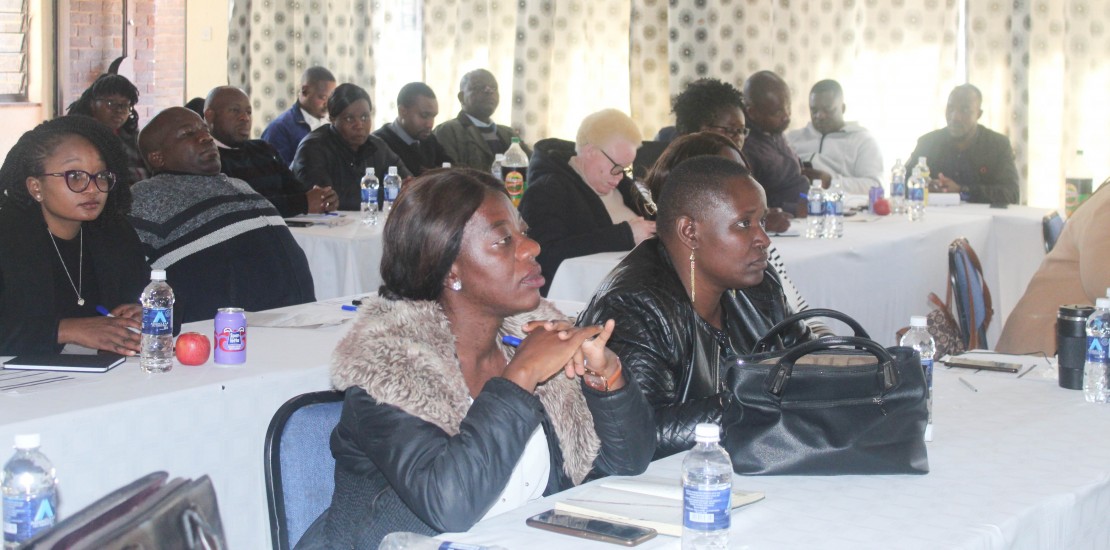- August 2, 2024
- Posted by: Clever K Mlambo
- Category: News

Zimbabwe is making significant strides in ensuring the protection and the upliftment of the welfare of children, this has seen the country aligning the Children’s Act with the constitution as well as with regional and international instruments. The country is also in the process of developing the Child Justice Bill, a proposed law that seeks to establish a separate child justice system.
The signing into law of the Children’s Amendment Act in 2023 has strengthened the legal framework for the protection of children. As part of implementing this law, the Ministry of Public Service, Labour and Social Welfare (MoPSLSW), with technical support from the Centre for Applied Legal Research (CALR) and UNICEF Zimbabwe, held a two-day training session from the 18th to the 19th of June 2024. The session was aimed at enhancing institutional and human recourse capacities of child protection officers by ensuring that they are abreast of new duties and obligations as reflected in the new law and other newly enacted laws such as the Criminal Procedure and Evidence (Sentencing Guidelines) Regulations and Criminal Laws Amendment (Protection of Children and Young Persons) Bill H.B. 4, 2024. In his opening remarks, the Acting Chief Director from MoPSLSW Mr T. Zimhunga indicated that this is one of the initiatives that the ministry is implementing in order to capacitate its child protection officers. He also acknowledged that the country is generally experiencing high brain drain, especially with regards to the high demand of social workers, especially in European countries.
The sessions detail the roles of child protection officers as frontline workers entrusted with the responsibility of protecting children from abuse, neglect and exploitation. Their duties encompass a wide range of activities, including investigation and assessment, responding to reports of child abuse, conducting thorough investigations and assessing the level of risk to the child.
The training sessions explored how child protection officers are critical in developing comprehensive case plans to address the needs of the child and their family, coordinating services and monitoring progress, thereby placing them at the nexus of child protection services. Stakeholders shared ways in which the child protection officers can enhance the provision of direct support to children and families, including counseling, therapy and family support programs.
The Ministry of Public Service continues to work with critical sectors involved in the child protection system, such as the Zimbabwe Police Service victim-friendly unit, the Judicial Service Commission, the National Prosecuting Authority, the Civil Registry Department, civil society organizations and religious institutions, among others. All this is a measure by the government to enhance child protection services.
The Deputy Chairperson, Law Development Commission and the Principal of the Judicial College of Zimbabwe, Mr. Rex Shana, made a key presentation on children in contact with the law and in conflict with the law, elaborating on the roles of child protection officers in both the criminal and civil justice systems.
The presentation interlinked the relationship between the Children Amendment Act and the Child Justice Bill. The latter seeks to create a separate justice system for children, which will be key for child protection officers as they discharge their duties. In operation, the Children Amendment Act will deal with civil matters, whereas the Child Justice Bill will deal with alleged child offenders. The Child Justice Bill is hinged on the restoration and reintegration of young offenders into society; thereby, it is crucial for child protection officers to understand their envisaged role in the proposed child justice system. This was emphasized through a session that was led by Ms. Tracy Mundanga, a regional prosecutor from the National Prosecuting Authority. She indicated that the role of child protection officers must not be downplayed in the justice system because they provide relevant guidance with regards to the background and circumstances interlinked to alleged child offenders or victims.
As the Child Justice Bill seeks to create a restorative justice system where the offenders are rehabilitated with their victims and the community, child protection officers will be key in facilitating and ensuring the smooth flow of this process.
The training enabled the child protection officers to be aware of their place in ensuring that the best interests of a child are realized. The Children Amendment Act repelled the definition of child probation officer and was replaced by child protection officers who are key in the administering of the best interests of children, ensuring that their welfare is of paramount importance.
Adequate protection of children is placed on the High Court by this new law, with the High Court being the upper guardian, a welcome measure in the Children’s Amendment Act in ensuring the enjoyment of child rights and enabling the protection of the children.
The previous law, the Children Act, defined a child as someone below 16 years; this anomaly has been rectified by the Children’s Amendment Act, and a child is anyone below 18 years. This is also in sync with Section 81(1) of the Constitution of Zimbabwe as well as Article 6 of the United Nations Convention on the Rights of the Child.
The law places a duty on professions that interact with children to report any child or suspected abuse; the professions include but are not limited to teachers, ministers of religion, medical practitioners, etc. These are all measures entrenched for the protection of the welfare of children. Child protection officers will work with these people in safeguarding the children.
The Children’s Amendment Act has significantly enhanced the powers and responsibilities of Child Protection Officers, empowering them to take decisive action to protect children. Key provisions of the Act discussed in the training sessions include expanding the circle of mandated reporters, ensuring that more professionals are obligated to report suspected cases of child abuse, providing child protection officers with greater authority to issue protection orders to safeguard children at risk, imposing harsher penalties for perpetrators of child abuse, sending a strong message of deterrence and implementing child-friendly procedures in investigations and court proceedings, minimizing trauma for children.
The training also included a presentation from the Civil Registry Department wherein it was indicated that child protection now has powers to obtain birth certificates for a child without parental care who is identified as a child in need of care or protection.
In her closing remarks, Ms. Faith Mavengere, a Child Protection Advisor from MoPSLSW, highlighted that the training will also be cascaded to District Social Development Officers as well as other key stakeholders who are interacting with child protection services.
